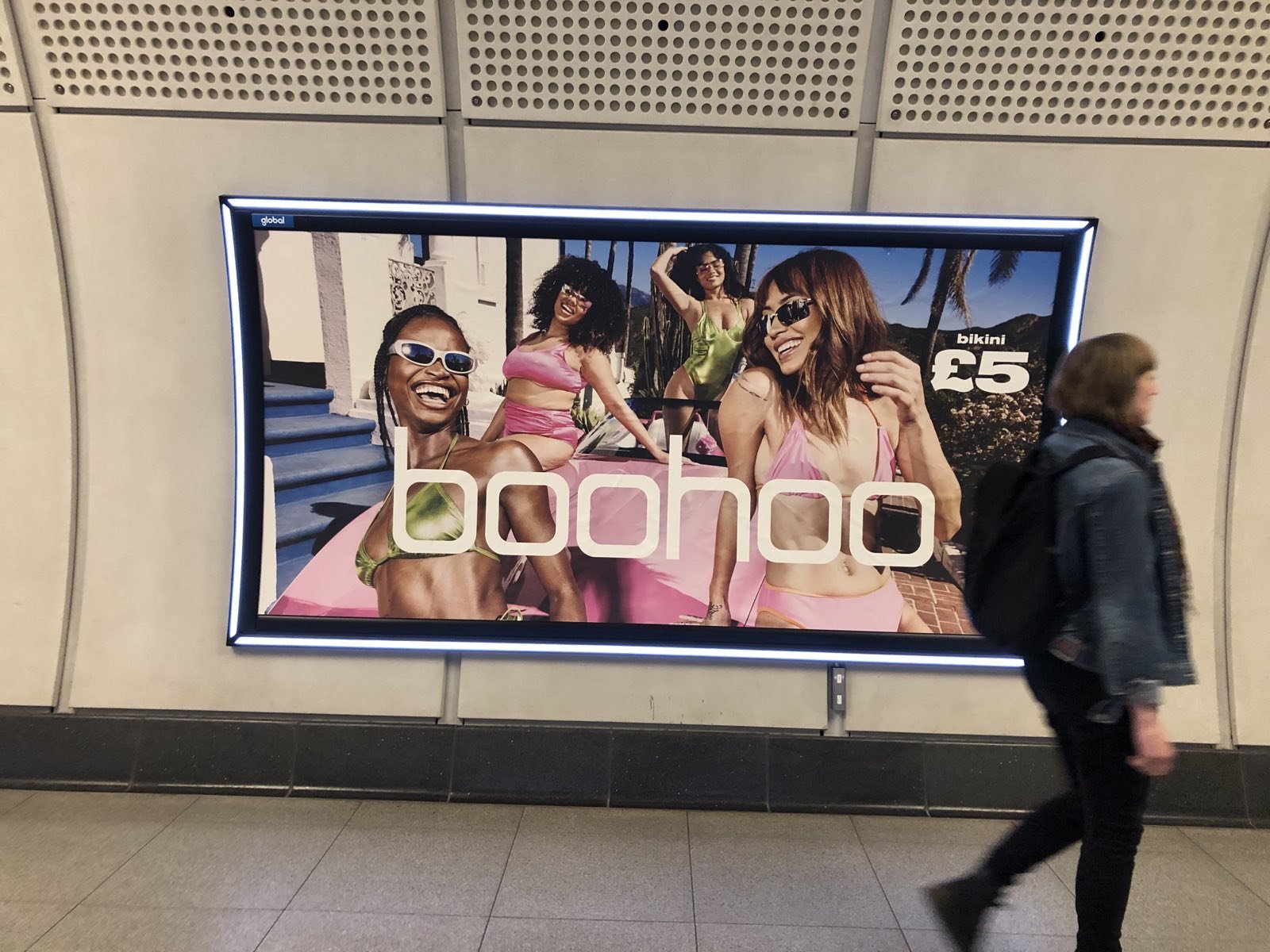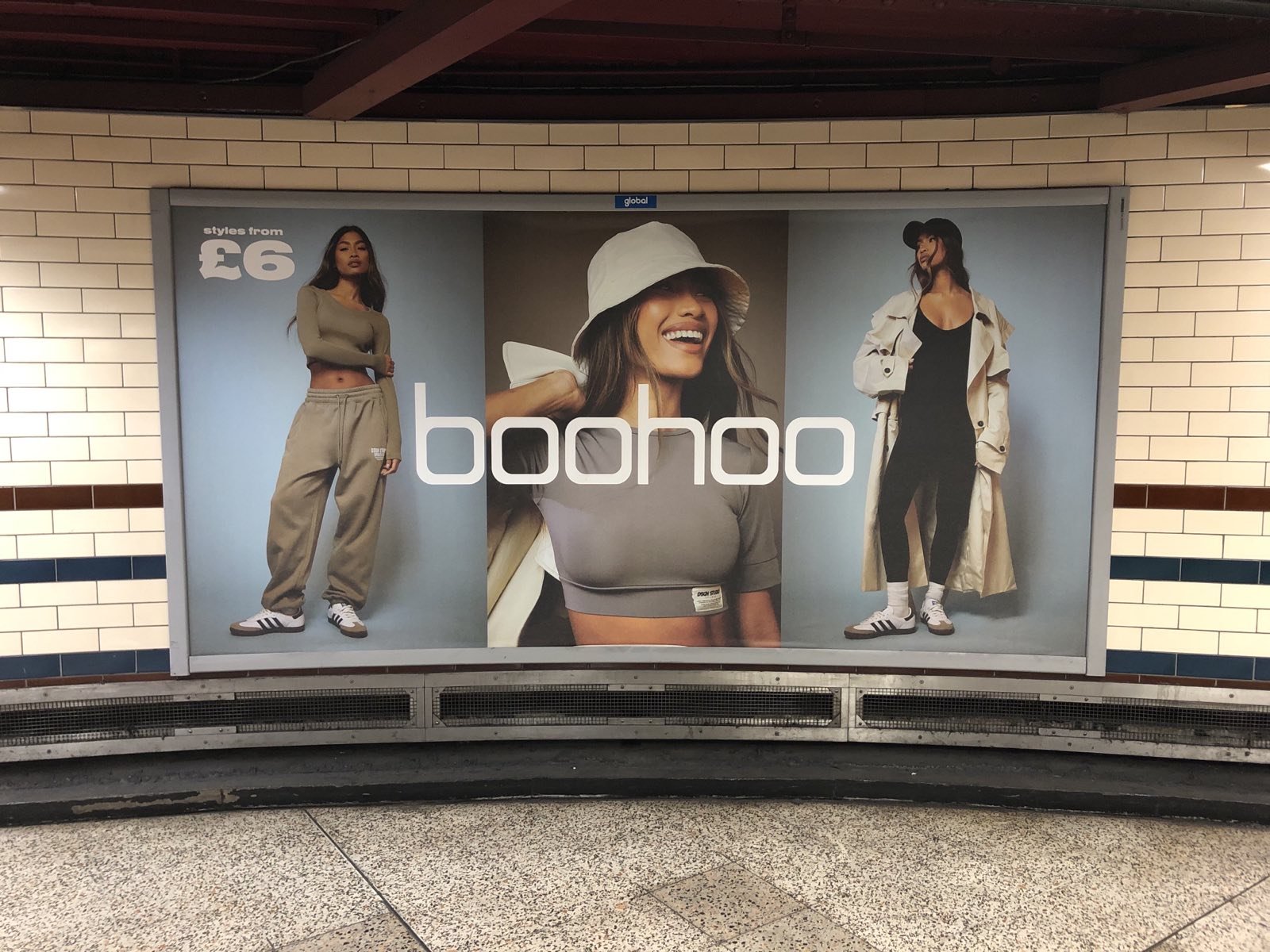Badvert of the Month: Boohoo
Advert by fast fashion clothing brand Boohoo
Location: London tube network, the Elizabeth Line
Company: Boohoo
The issue of fast fashion advertising was discussed as part of Badvertising & Adfree Cities ‘Emerging Issues in High-carbon Advertising’ webinar on 28th June 2023.
According to the United Nations Conference on Trade and Development, fashion is the world’s second most polluting industry behind the fossil fuel sector. From its extreme water consumption, estimated at 79 trillion litres per year, to the mountain of over 92 million tonnes of waste the industry creates, alongside its dependence on toxic and polluting synthetic fibres, the sector bears a huge impact on the planet. The fashion sector is also heavily tied with the fossil fuel industry given that synthetic fibres are made using fossil fuels, which currently account for 1.35% of global oil consumption. With synthetic fibres’ production expected to ramp up over the next decades, in less than 10 years almost three-quarters of our textiles will be derived from fossil fuels. On its current trajectory, the fashion industry is set to closely align with the fossil fuel industry.
In terms of fashion’s carbon footprint, conservative figures suggest that fashion emits about 4% of global emissions. Even with a conservative estimate, reaching the most ambitious goal of the Paris Agreement of 1.5-degree warming would imply reductions of 50% to 60% by 2030, compared to 2018 levels. Worse still, fashion’s environmental impact is deeply unequal between and within countries. In the UK, the richest 20% need to reduce their footprint of fashion consumption by 83% to align with the 1.5C temperature goal, while in Indonesia 74% of the population currently live below 1.5C-compatible consumption levels of fashion. But far from attempting to clean up its act and align with international climate targets, the sector is set to increase its global greenhouse gas emissions by almost 50% by 2030. As a result, the global fashion industry will be emitting the same amount of emissions as released by India in 2021, the most populous nation on earth and the third largest emitter of greenhouse gases after China and the USA.
Besides its toll on the environment, the fashion industry has an appalling track record of human rights abuses due to the deleterious working conditions of its garment workers, most often located in the Global South but also in Europe, who are facing issues ranging from job loss and insecure work, unpaid wages, unsafe conditions, and harassment at work.
The problem with fast fashion ads
The growth of the fashion industry as we know it, referred to as fast or even ultrafast fashion, has largely been facilitated by aggressive advertising campaigns pushing demand for fast-moving trends at low prices and promoting a model centred around the disposability of clothes leading to overconsumption, overproduction, and mountains of clothing waste.
Advert for Boohoo spotted on London’s tube network on 19th February 2023
Adverts such as these by the infamous brand Boohoo, forcefully promote cheap clothing at the expense of the garment workers and the planet. No clothes that are produced sustainably and ethically, where workers would be treated and remunerated fairly, can cost as little as in those advertisements. The ‘true cost’ of cheap fashion is that of workers exploitation and environmental degradation.
There is also a social justice element behind this type of advertising given that these ads are largely targeting consumers in wealthy developed countries who bear a historical responsibility for cutting their carbon emissions fastest.
Boohoo: prized for human rights abuses and greenwashing
Boohoo made the headlines in 2020 during the Covid-19 pandemic after the campaign group Labour Behind the Label published a damning report on the company for not respecting social distancing rules and paying workers as little as £3/hour in its factories in Leicester. Prior to this, a 2017 Channel4 Dispatches series had raised the issue of garment workers paid below the minimum wage in Leicester’s garment factories. The claims were denied by the company.
An investigative report by the Sunday Times followed which prompted the UK Government to address the scandal around illegal wages for garment workers in Leicester. In the wake of the accusations, the fashion retailer commissioned an independent review by a lawyer into its suppliers which confirmed the initial allegations of widespread abuses by campaigners and journalists. Following this work, the company announced in March 2021 to have cut ties with hundreds of outsourced suppliers to keep only 78 UK suppliers. However, over a year later, a new survey - funded by the fashion retailer itself - found that garment makers employed by Boohoo still suffered from poor working conditions, including below minimum wages, lack of sick pay and holiday pay and illegal working statuses.
Far from keeping a low profile, the company is gushing about its corporate social responsibility and supposedly green standards on its website, claiming to aim for 52% carbon emissions reduction relative to its growth by 2030 (while small print indicates that this would translate to a reduction of 4.2% of its annual operational emissions and 7% of its value chain emissions relative to its growth). This is despite the company being named one of the two least sustainable fashion brands in the UK, alongside Missguided, in a 2019 report by the Environmental Audit Committee.
In February 2023, Boohoo hosted a panel on ethical fashion, as part of the sustainable sourcing show Source Fashion, where members of the company praised the good work they were doing. Fair fashion activists attempted to put questions to the panel without any success and ended up forcibly escorted outside the room after trying to voice concerns over the company’s human rights abuses and greenwashing practices.
Boohoo, alongside ASOS and George at Asda, is currently under investigation by the UK Competition & Markets Authority (CMA) who have launched an investigation into fashion retailers for their greenwashing claims. Results are yet to be published by the organisation.
With all this in mind, it is only fair to assume that fast fashion ads should be given similar scrutiny as other high-carbon adverts by fossil fuel, car or airline companies. We cannot afford to keep up with the current fashion model, with its disastrous impacts on people and planet, and its promotion must be stopped accordingly.
Company background: Boohoo
Boohoo is a British online fashion retailer, founded in 2006 by two executives who previously worked with Primark and New Look. The company sells clothes aimed at 16-30 years old with over 36,000 products. Each year, Boohoo sells about 207 million items. In 2019 the company sales totalled £856.9 million. The company acquired the brands and online presence of several defunct high street retailers. Boohoo als owns online fashion retailers Pretty Little Thing, Nasty Gal and MissPap.
Over the next two years, Boohoo CEO John Lyttle is set to receive a bonus worth 200% of his salary, which is worth over half a million pounds a year.
In 2020, during the height of the Covid-19 pandemic, Boohoo was faced with allegations of modern slavery while being found to put its workers at risk of covid and paying them below the minimum wage at £3.5/hour. Meanwhile the company recorded an increase in sales by 44%, totalled at 1.2 billion pounds.


